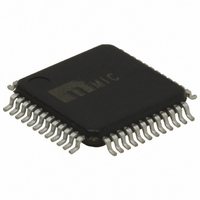KSZ8041FTLI Micrel Inc, KSZ8041FTLI Datasheet - Page 37

KSZ8041FTLI
Manufacturer Part Number
KSZ8041FTLI
Description
Physical Layer Transceiver 10/100BASE-FX ( )
Manufacturer
Micrel Inc
Type
Transceiverr
Datasheet
1.KSZ8041MLLI.pdf
(65 pages)
Specifications of KSZ8041FTLI
Number Of Drivers/receivers
1/1
Protocol
SMII
Voltage - Supply
3.135 V ~ 3.465 V
Mounting Type
Surface Mount
Package / Case
48-TQFP, 48-VQFP
Lead Free Status / RoHS Status
Lead free / RoHS Compliant
For Use With
576-3294 - BOARD EVALUATION KSZ8041FTL
Lead Free Status / RoHS Status
Compliant, Lead free / RoHS Compliant
Other names
576-3347
Available stocks
Company
Part Number
Manufacturer
Quantity
Price
Company:
Part Number:
KSZ8041FTLI
Manufacturer:
MICREL
Quantity:
5 000
Part Number:
KSZ8041FTLI-TR
Manufacturer:
MICROCHIP/微芯
Quantity:
20 000
Micrel, Inc.
100Base-FX Fiber Operation (KSZ8041FTL only)
100Base-FX fiber operation is similar to 100Base-TX copper operation with the differences being that the scrambler/de-
scrambler and MLT3 encoder/decoder are bypassed on transmission and reception. In addition, auto-negotiation is
bypassed, auto MDI/MDI-X is disabled, and speed is set to 100Mbps. The duplex can be set to either half or full. Usually,
it is set to full-duplex.
Fiber Signal Detect
In 100Base-FX operation, FXSD (fiber signal detect), input pin 48, is usually connected to the fiber transceiver SD (signal
detect) output pin. 100Base-FX mode is activated when the FXSD input pin is greater than 1V. When FXSD is between
1V and 1.8V, no fiber signal is detected and a Far-End Fault is generated. When FXSD is over 2.2V, the fiber signal is
detected.
100Base-FX mode and signal detection is summarized in the following table:
To ensure proper operation, a resistive voltage divider is recommended to adjust the fiber transceiver SD (signal detect)
output voltage swing to match the FXSD pin’s input voltage threshold.
Alternatively, the Far-End Fault feature can be disabled. In this case, the FXSD input pin is tied high to 3.3V to force
100Base-FX mode.
Far-End Fault
A Far-End Fault (FEF) occurs when the signal detection is logically false on the receive side of the fiber transceiver. The
KSZ8041FTL detects a FEF when its FXSD input (pin 48) is between 1V and 1.8V. When a FEF is detected, the
KSZ8041FTL signals its fiber link partner that a FEF has occurred by transmitting a repetitive pattern of 84-ones and 1-
zero. This pattern is used to inform the fiber link partner that there is a faulty link on its transmit side.
By default, FEF is enabled. FEF is disabled by strapping “no FEF” (pin 43) low. See “Strapping Options” section for detail.
December 2009
FXSD Input Voltage
Less than 0.2V
Greater than 1V, but less than 1.8V
Greater than 2.2V
Table 11. Copper and Fiber Mode Selection
Fiber mode
Mode
Copper mode
No signal detected
Far-End Fault generated (if enabled)
Fiber mode
Signal detected
37
KSZ8041TL/FTL/MLL
M9999-120909-1.2












